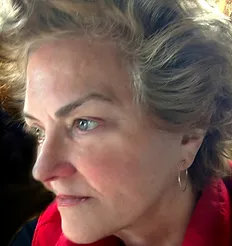“Show me your original face before you were born.” Zen koan.
In the lyrical memoir, Rearranged: An Opera Singer’s Facial Cancer and Life Transposed (Heliotrope Books, October 2023), Kathleen Watt skillfully shows us how losing the face we present to the world can lead to a deep exploration of the meaning of one’s life.
Watt was an opera singer, first as a soloist, then as a member of the Metropolitan Opera Chorus. Her illness narrative began when she felt a lump at the gumline of her upper jaw and then moved through delays in diagnosis, the search for competent and caring practitioners, radical surgery, and a change in her relationship with her partner.
Learn more about author Kathleen Watt at kathleenwatt.com or @kewatt @kathlwatt or on Facebook
Her diagnosis was bone cancer or specifically, chondrosarcoma, a most unusual malignancy with involvement of soft tissues of the mouth. This would develop into osteosarcoma, an aggressive malignancy of bone itself. Subsequent scans showed the lump was only a part of the tumor that filled her maxillary sinus and her upper nose. With an opportunity for a cure, surgeons removed a significant amount of her facial bones and soft tissues, leaving a large area for reconstruction.
She entered into a world of surgery, bleeding, tracheostomy, failure of the reconstruction and chemotherapy that seemed endless. Yet, Watt learned to speak and swallow again, and even to sing.
The process lasted seven years with many of the complications of maxillofacial reconstruction: failure of soft-tissue graft, infection, and at its most extreme, a five-day coma.
Oddly enough, one of the highlights of this book is Watt’s description of her post-op delirium. Colorful, humorous and heartbreaking, this section provides an insightful look at the experience called “ICU psychosis.”
She writes:
“Propped in my bed, unable to speak, unable to see clearly, my gaze wandered to the watery shapes that moved silently across my room and back, then haltingly across and back again, tumbling and rolling, end over end, starting and stopping in a staccato that made me doubt my eyes—but also reminded me of something.”
Unable to speak, she scribbles,
“ARE THEY PLAYING FOOTBALL RIGHT THERE?”
“Where?” said Evie.
BEYOND THAT SEE-THROUGH WALL RIGHT THERE!”
Her vivid language throughout brings an up-close and personal feel to the narrative and Ms. Watt explores her medical procedures in deep and accurate detail:
“A surgeon who called himself “The Carpenter” employed a drill and an oscillating saw to breach the maxillary sinus—that hexagonal hollow sharing walls with the eye socket above, the hard palate below, the infratemporal fossa behind, the nasal cavity, and the cheekbone in front.”
Between the medical sections, Watt takes us backstage at the Met, on visits with her younger self, and through the highs and lows of her marriage. At times, I found these digressions tangential to the main narrative. Sure, they contain essential information, but tighter editing would have smoothed the transitions.
Watt and her partner tried to resume a normal life when the cancer was controlled and only minor surgeries required, but the stresses of prolonged illness and caretaking proved to be too much. After Watt had an extramarital affair with a mutual friend, the couple parted, but a deep friendship remained.
That friendship resulted in Watt’s former partner (named Evie in Rearranged) to become her publicist and through her efforts, I interviewed Kathleen via a Zoom meeting in mid-July. I asked Kathleen what she thought when she looked in the mirror during a time when her face was severely disfigured. “I didn’t think about it much at all. There were bigger issues,” said Watt. “I had cancer. I wanted to sing again.”
I also asked Watt how she thought the average reader might react to her descriptions of surgical procedures and post-operative care.
“People need to fully understand what was happening,” she said. “Over and over this was complicated and difficult surgery.”
Lucy Grealy, the poet and essayist, wrote a notable 1994 memoir, Autobiography of a Face, about her experience growing up with extreme facial disfigurement and repeated surgery to repair it. However, her journey began in childhood at age nine. Watt’s memoir provides a mature view on this topic, where the issues are much different.
In one passage, for example, Watt writes, “All I’ve ever wanted, really, is to know what is humanly possible. For in the right combinations, certain strains of human striving—unconditional kindness, love, conscious sexuality, parenthood—contain a potency and a viability something like divinity, or like nuclear fission, terrifying and transformative.”
Overall, I would recommend Rearranged for its insightful exploration of a specific trauma met with grace and resiliency. Oh, and she looks, and is, beautiful. - Maureen Hirthler
Maureen Hirthler, a retired emergency physician, holds an MFA from the University of Missouri-Kansas City and is managing editor for Intima—A Journal of Narrative Medicine. Her work has appeared in Pulse, JAMA, Creative Nonfiction, Hektoen, Ars Medica, The Examined Life Journal and elsewhere. “I began writing to process my work experience. In my writing, I look for events (past or current) that capture my imagination and come with an emotional punch. And I raise beautiful orchids.” Read her most recent essay “Burnt” in Pulse.



